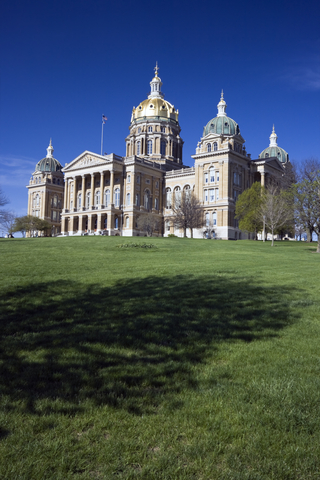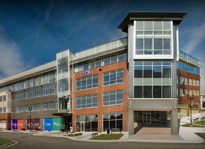
[Updated Oct 2020] A guide to executive suites and office space for rent in Des Moines as well as general information that may be useful if you are thinking of renting offices in Des Moines.
For further Des Moines offices information or to search office space to rent in Des Moines just click. Or contact us for any office space search inquiry.
History & Geography
Des Moines is the capital of Iowa and the largest city in the state. It lies to the south of the state near the Des Moines River, a major tributary of the Mississippi. The city was named for Fort Des Moines, which was in turn named for the nearby river. The fort was established in 1843 by Captain James Allen in order to keep the Sauk and Meskwaki tribes under control. Only three years later the fort was abandoned when the tribes were relocated. Settlers occupied the fort soon after however and a thriving settlement grew up. In 1851 much of the town was destroyed by a major flood, including the settlers’ crops and livestock. This provided a blank canvas for a new settlement to grow up, however, and soon there was significant coal mining activity along the Des Moines River. In 1851 Des Moines was incorporated and in 1857 the capital was moved to Des Moines from Iowa City. After the railroad came to the city in 1866 it grew rapidly and prospered economically. Throughout the latter years of the 19th century, the city continued to mine the coal in the region surrounding it extensively. By the turn of the century, Des Moines was a boomtown and had the largest population of any city in the state. During the early stages of the 20th century, the city underwent an extensive refurbishment process under its ‘City Beautiful’ project which saw the construction of a raft of new buildings. However, in the later part of the century, Des Moines declined as its industry dried up. This decline lasted until the 1980s when the city managed to reinvent itself and a host of service-orientated industries sprang up. Today Des Moines has a thriving economy and is one of the most prosperous cities in the region.
Economy
Like many post-industrial cities in the US Des Moines has managed to develop a fairly diverse economy. However, the largest industry in the city is the insurance industry. Des Moines has become a hub of the insurance trade with many of the country’s largest companies headquartered in the city. Among the largest headquartered in the city are EMC Insurance Group, Allied Insurance, Wellmark Blue Cross and Blue Shield, American Republic Insurance Company and Holmes Murphy. The city also has a significant financial services industry which is another major driver of the economy. Among the outfits which have a large presence in the city are Electronic Data Systems, Wells Fargo and ING Group. Some of the other largest employers in Des Moines are Drake University, Titan Tire, Firestone, CDS Global, Iowa Health System, and The Meredith Corporation, a large publishing house. Des Moines was recently featured in Forbes’ list of Best Places for Business and Careers. The median income for a household in Des Moines is USD 38,808 and the per capita income for the city currently stands at USD 19,467. Approximately 11 percent of the city live below the poverty line.
Tourism & Culture
Des Moines is certainly not among the major tourist attractions in the US and tourism plays only a small part in the city’s economy. However, the city is something of a cultural hub for the region and has a thriving art and theater scene. Among the top venues in the city is the Civic Center of Greater Des Moines, which often hosts some of the most popular shows from Broadway. Another cultural icon is the Des Moines Metro Opera, which since 1973 has been one of the most respected opera houses in the area. Yet another destination for culture vultures in the city is the Des Moines Arts Center, which has a wing designed by famed architect IM Pei and features a number of art exhibitions as well as cultural programs. Among the architectural attractions in the city is the Iowa State Capital, which has a 275 dome coated in gold leaf. There are also a number of events annually which bring visitors flocking to Des Moines. The Des Moines Art Festival in June is always popular, as is the World Food Festival, which takes place in October. Finally, the 80/35 Music Festival is one of the most acclaimed of its kind in the region.
Transportation
Des Moines is distinctive for its skywalk system. The city has over four miles of enclosed walkways, making it one of the largest of its kind in the country. There is also an extensive bus system operated by the Des Moines Area Regional Transit which includes service to outlying suburbs. A light rail system for the city is currently under discussion however no major moves have been made to implement it thus far. Des Moines is served by Des Moines International Airport which is in the southern part of the city and serves various destinations throughout the country.

Office space for rent in Des Moines
Currently, the vacancy rate for Grade A office space in Des Moines stands at a little over 8 percent. Besides for the CBD, most office space can be found in the western suburbs, and northeast and northwest Des Moines. The city’s economy is rebounding from the recent recession but it is doubtful any new projects will be tackled as supply is still keeping pace with demand. Some office space is being changed to residential space. Des Moines has a positive absorption rate, mostly because of the uptake by medium to large businesses.
Our office space search, advisory and acquisition services are FREE, always. Our Des Moines office space brokers and agents are globally regulated by the Royal Institution of Chartered Surveyors (RICS) ensuring the highest standards of commercial property advice and service at all times.

The Office Providers are Regulated by the RICS